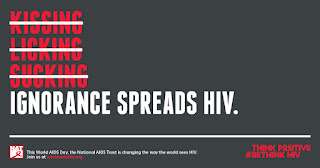#RethinkHIV on World AIDS Day
December 1st
is World AIDS Day. This year’s World AIDS
Day campaign, determined by the United Kingdom’s National AIDS Trust, is #RethinkHIV. Their goal is to
dispel some of the commonly held beliefs about HIV contraction and people
living with HIV that are false.
Recently, when
actor Charlie Sheen disclosed his positive HIV status, there were many
questions from his fellow actors, namely Jenny McCarthy, about their exposure
to HIV. This has been a great
opportunity for those in the HIV/AIDS educational community to remind people that
HIV is NOT spread by kissing, touching or licking.
Another
common misconception is that all intravenous drug users have contracted
HIV. This is also not true. I found this statistic especially
surprising.
The campaign
has many suggested Twitter and Facebook posts to participate in World AIDS
Day.
One of the
suggested posts from the campaign is “There are only three ways to get HIV-unprotected
sex (95%), sharing needles, and mother-to-child transmission.” According to the same website, 99.5% of
children born from HIV positive women don’t have HIV. Therefore, as seen in the suggested quote, the
greatest number of infections is occurring through unprotected sex. Of course, I advocate strongly for the use of
prophylactics-condoms, dental dams, etc., but we must be cognizant that there
are people who are unable to use these precautions.
Some people
who are victims of sex trafficking are not allowed by their trafficker to
negotiate condom use. Some buyers will
pay more to not use a condom, and victims of sex trafficking are not able to
turn down that additional money, either out of necessity or due to quotas from
their trafficker.
HIV/AIDS is a
disease that can affect anyone. One
time, one person, one mistake. I say
this not to cause fear, but to cause empathy.
People who have contracted HIV did not choose to be infected. There are many reasons that people cannot
protect themselves. Please honor World
AIDS Day by having compassion for those infected, and trying to prevent more
infections by spreading awareness.






Comments
Post a Comment